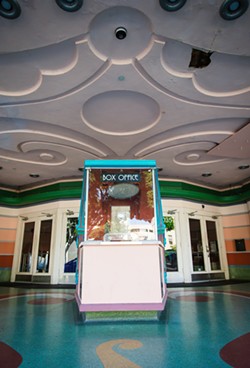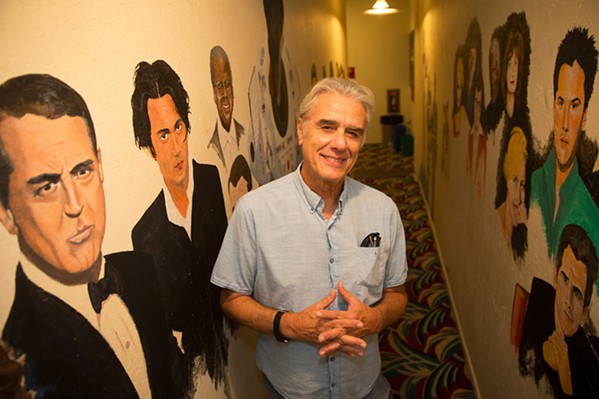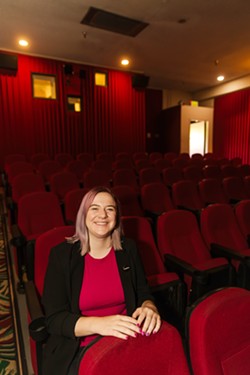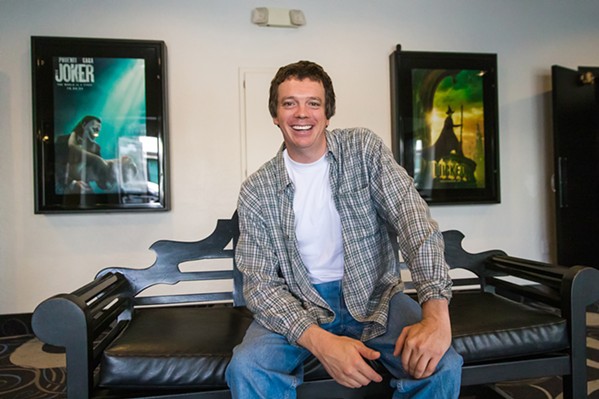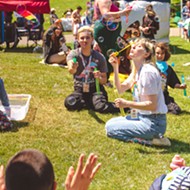[
{
"name": "Newsletter Promo",
"id": "NewsletterPromo",
"class": "inlineCenter",
"insertPoint": "4",
"component": "15264767",
"requiredCountToDisplay": "0"
},
{
"name": "Ad - Medium Rectangle CC01 - 300x250 - Inline Content",
"class": "inlineCenter",
"insertPoint": "8",
"component": "15582119",
"requiredCountToDisplay": "12"
},{
"name": "Ad - Medium Rectangle LC01 - 300x250 - Inline Content",
"class": "inlineCenter",
"insertPoint": "18",
"component": "15582122",
"requiredCountToDisplay": "22"
},{
"name": "Ad - Medium Rectangle 9 - 300x250 - Inline Content",
"class": "inlineCenter",
"insertPoint": "28",
"component": "15582121",
"requiredCountToDisplay": "32"
}]
When's the last time you were in a movie theater? Pre-pandemic? Longer?
Even before COVID-19 temporarily closed theaters, the industry was struggling, forced to compete with VHS and later DVD rentals, then dealing with rental distribution innovators like Redbox. And then came the most ubiquitous way we consume film media, streaming services like Netflix, Amazon Prime Video, Hulu, and Disney Plus, which ushered in the demise of Blockbuster and other film rental businesses.
The pandemic merely took a challenging business situation and made it worse.
"The only reason the Palm Theatre is running right now is I was able to get a grant coming out of the pandemic," venue owner Jim Dee explained. "It was called the SVOG—the Shuttered Venue Operators Grant—and if you were a movie theater or live theater, you were able to get this grant. I applied and I got it, and if I didn't have that I probably would have closed. To be thoroughly honest, for those two years, the bank account was just going down. It was scary."
Cinemas used to be big business. In 2002, the average annual number of tickets sold per person in the U.S was 4.2, which had dropped to 3.5 by 2019 ... before the pandemic decimated theaters. Today, sales are slowly climbing again but remain low by historical standards. How can theater operators lure customers back to the big screen?
"Certainly it's been a struggle since the unfortunate COVID lockdowns and closure of our theater for over a year with the landlord demanding full rent," said Bruce Sanborn, who owns The Movie Experience that includes Atascadero Colony Cinemas and Downtown Centre 7.
"Then when things started getting better—Barbie and Oppenheimer—along comes the actors' strike," Sanborn said via email. He noted that fewer films being released, shorter windows between theatrical and streaming releases, and tighter profit margins were added aggravations.
"And the theaters in downtown SLO were hit very, very hard by the city of SLO," he added. "Our business since last July 1, when the parking fees went sky high, has really dropped off."
Parking rates were also a real point of contention for the Palm's Dee, but the city has since lowered parking costs.
"Post pandemic, there was a quantum shift of people not wanting to come back to movie theaters," Dee emphasized. "And that's not just my theater, that's across the board. On top of that, I think we're still getting the repercussions of the writers' and actors' strikes. During the pandemic, people learned how to stream more quickly. It was coming, but I think it sped it up.
"With streaming, I think we lost our older audience. I could show a Judi Dench film or Maggie Smith, and we'd have seniors. Now? They're not gone, but it's not like it was."
Coming out of the pandemic, Dee's situation bordered on desperate. People were slow to come back, annoyed by mask mandates, and still fearful of infection. The seasoned theater businessman felt like he'd tried everything. Then he began cultivating a younger audience.
"Lo and behold, from my young staff, they were saying, 'Hey, bring in some old films.' This was something I did back in the '80s."
Dee's been in the movie screening business for more than five decades. He opened San Luis Obispo's first art house theater, The Rainbow, in 1979. But even before then as a Cal Poly student, he and fellow student Paul Karlen had a film club called Cinema Zoo that they started in 1973, where they used a 16mm projector to show films such as Ingmar Bergman's 1957 masterpiece The Seventh Seal. They'd rent a venue for $15 a night and charge filmgoers 75 cents to get in.
"It was fun. Those were the early days," he recalled.
He and his wife, Patty, opened the Palm Theatre in 1988, after renting and renovating a building on Palm Street into three screens with a combined 268-seat capacity. They eventually bought the building outright in 1991. In 2004, the Dees installed solar panels on the theater's roof, making it the U.S.'s first solar-powered theater.
When he was finally able to reopen after the pandemic, he often couldn't get more than 10 people for a screening. Then, he booked Charlie Kaufman's 2004 sci-fi romance Eternal Sunshine of the Spotless Mind and was getting 70 people to a screening.
"I showed Butch Cassidy and the Sundance Kid [1969]—80! And the other movies I'm showing, new movies, 10, 12 people. There's sort of this idea, 'Oh, if it's new, I'll stream it.'
"It's wild."
A new era
Since adopting this new model and getting the Palm back on better but still tenuous financial footing, the Dees officially retired and now lease the Palm Theatre to the SLO International Film Festival (SLOIFF), which has continued innovative programing and now operates the theater as a nonprofit.
"Jim came to us in 2019, even before the pandemic, just trying to figure out what the next phase of the theater would be, and also for him to retire and what that would look like," SLOIFF Executive Director Skye McLennan explained. "Then the pandemic happened."
Dee decided to ride it out a little longer, but it was challenging to rebuild the business, so then about a year ago, plans started to come together to transfer operation of the theater to the film festival.
"That's what was and is happening around the landscape of theaters across the United States," McLennan noted.
Many of these small, independent theaters have turned nonprofit.
"I went to a large conference called IND/EX, which had a little over 700 people there, all working in these indie theaters or film festivals. This kind of model is happening everywhere to save these institutions or theaters in their communities, so nonprofits or film festivals are taking over venues," she added. "We're emphasizing the idea that we want the Palm to stay here forever and be in our community."
McLennan and the SLOIFF have continued Dee's model of screening some first-run films, even though they're much more expensive, and they've continued expanding their offering of older classic, art house, and cult films. Operating the Palm as a nonprofit also opens up grant opportunities.
"We're definitely trying to amp up the rental side of things too," McLennan added, "which we're seeing is really helping keep things afloat by partnering with other nonprofits and letting them use the space. But also, what we're finding is we're bringing the energy of what we do at the festival, like having special guests and screenings, making it feel—as someone said in the IND/EX conference—'like an experience you can't download.' So adding that element is helping bring people through the doors. I think the key is diversifying revenue streams."
One of the theater's successful innovations was a special screening of George Miller's 1981 sequel Mad Max 2: The Road Warrior, attended by one of the film's actors.
"My dad [Stewart Finlay-McLennan] was actually in Mad Max 2: The Road Warrior, and we screened the film, and I asked him to do a Q-and-A," McLennan noted. "We had a full theater, and people were laughing and screaming and just interacting with the film. He did the Q-and-A, and after, people came out of theater—people who hadn't been to a theater in years—and came up to me and were, like, 'That was so cool. I haven't had that kind of experience with other people in a movie theater in so long!'
"I think it just takes one time to remind people what that's like."
That's the thing about movie theaters. It's not like streaming a movie at home on your TV with a million little distractions surrounding you. Going to a movie theater is a shared experience. You get your ticket and commit, buy some popcorn, settle into your seat, and the lights go down. You're in a room full of strangers, but you're all about to take a ride together.
"The theater is one of those places where you're fully immersed in the experience, and you experience the film in such a different way. It transports you, right?" McLennan said. "We just need to remind people of that."
Creating a draw
Theaters have tried everything from installing electric recliners to offering beer and wine and serving upscale concessions to create an experience you can't have at home, even with your 80-inch flat screen and surround sound system. What many theaters are discovering and capitalizing on is exactly what Dee and the SLO Film Fest are doing: drawing on nostalgia and banking on audiences coming out to revisit and share the films they love. We've probably all seen Butch Cassidy and the Sundance Kid on TV, but it's not like seeing it on the big screen with an audience.
Sanborn also learned years ago that expanding audiences is key. Yes, Downtown Centre 7 and Atascadero Colony Cinemas mostly screen first-run films, but Downtown Centre also has the SLO Rewind and Screening Room Classics series, and Colony has Flashback Cinema—series that bring in older, audience-pleasing titles. Did you love The Goonies as a kid and now want to share that experience with your own children? That's who these special screenings are meant to attract.
Downtown Centre 7 is showing the 2004 teen comedy Mean Girls at the beginning of October. In the run-up to Halloween, the Bay Theatre of Morro Bay is screening Coraline (2009), Invasion of the Body Snatchers (1957), and Psycho (1960).
Cameron Wilson, whose family bought the 315-seat Bay Theatre earlier this year, is definitely the new kid on the block. His theater was constructed in the early 1940s as a single-screen motion picture theater, and since 1975, it had been operated by the Jannopoulos family until the Wilsons took over.
"Definitely a big risk and learning experience," Wilson admitted. "I went to film school at UCSD, and I have such a love of classics and more independent stuff, so I knew I wanted to expand the programing when the timing seemed right. I didn't want to just step in on the scene and say, 'Hey, we're doing movies I like and old movies, so everybody buckle up.' I didn't want to impose a lot of new programming because I wanted to get a feel for how the locals patronized the theater and what they're looking for."
The Bay Theatre mostly relies on the traditional first-run movie model, but Wilson will sometimes wait until a film has been out a couple of weeks and is less expensive before bringing it to the Bay. This week, however, he's screening Joker: Folie à Deux on its opening day, Oct. 4, an expensive gamble.
"As new owners, we are paying advances on everything we play because the film companies don't know us," he explained. "You know, the Jannopoulos family had a legacy of all these [connections] and relationships, but we're definitely having to prove we can turn the numbers around."
The Monday night Salty Cinema Series is their way of expanding beyond first-run films while still meeting the demands of film distributors.
"That's why I like Mondays," Wilson noted, "because The Wizard of Oz, tried and true. Casablanca, tried and true. For Oz, I think we had almost 150 people."
Most of those profits remained with the theater.
The cost of doing business
"We actually have to pay out a bigger percentage the better a film does globally," Wilson continued. "So, if a film is not really ticking the pulse on a global scale, it's going to stay cheap. However, if it's a box office smash, the percentage we pay out increases, and not just for our theater but across the board."
What makes it tough is this increased percentage has nothing to do with the Bay Theatre's numbers. If they have a global smash hit that nonetheless is tanking in Morro Bay, they still have to pay the higher rate.
In essence, the film distributers are rewarding themselves for an effective publicity campaign and global success.
"That's a weird, flexible part of the business," Wilson admitted.
Playing a first-run film comes with other requirements, too.
"Two weeks is the minimum run on a brand-new title on the day that it releases," he noted. Often, distributors require as many as three weeks.
"Screening old films is much less expensive," Dee agreed. "Anything new you're going to be paying something like 50 percent [of the gross box office receipts], and a lot of time things tank, and you're still going to pay this high percentage."
If a theater operator guaranteed a two-week run and no one's coming, they're still required to play it for all the showtimes, three or four times a day, for the full two weeks.
The business in general used to be less cutthroat too. It used to be that if the Palm Theatre had a film, Downtown Centre 7, which is only a few blocks away, couldn't touch it, and vice versa. The closest the same film would play was Atascadero or Arroyo Grande, but that business agreement is now long gone.
Dee had the Brendan Fraser film The Whale, which was getting Oscar buzz, so the distributor decided to also book it in the Downtown Centre.
"I tell them, 'This theater is two blocks away from me.' They don't care. They do not care. I had The Holdovers booked, we had terms, and I asked, 'Is this going to play the Downtown Centre?' They said, 'Yeah,' so I canceled."
Now McLennan is navigating these shark-infested waters.
"We'd love to still do first-run films, but it's been hard figuring out how to do it," she admitted. "The distributors really haven't been playing nice. In the past, they would really have huge marketing budgets and put a lot into promoting these films and getting awareness out about the films. That has all kind of ceased to exist.
"There are still a lot of indie films out there that we want to showcase, and there's nowhere else that's showing them. I think we're just going to have to be a little more selective."
Where the profits come from
Not long ago on the Nextdoor app, a thread was discussing what a gem the Sunset Drive-In was. The post lamented that tickets were a little expensive, but you could bring your own food in, which made the experience cheaper. The idea lost on those discussing the Sunset Drive-In is that it and all theaters make their money on concessions.
Independent venues the Fair Oaks Theatre in Arroyo Grande and the Sunset Drive-In in San Luis Obispo have long been owned by the Rodkey family.
"My parents purchased the Fair Oaks in 1966 and has been in the family ever since," proprietor Larry Rodkey explained via email. "I've had the Sunset since 1984, where we made a deal with the owner to lease it. I also have the Skyline Drive-In in Barstow, which I purchased in 1995."
Unlike most theaters, drive-ins were better designed to weather the pandemic.
"It was the only way people were able to watch movies during COVID since everything was shut down," Rodkey noted. "It was the drive-in theater industry's best year in decades."
One way Rodkey created a new revenue stream is his popular weekly Sunday swap meet at the Sunset Drive-In, which he said "helps keep us alive. Without the swap meet, it would be difficult to stay open."
In case you've heard rumors the drive-in is closing, not true, said Rodkey. "The only thing we have had to do is raise the prices to compensate for the rise in labor cost."
"Where you make your money in the theater industry is at concessions," McLennan agreed, "because that's yours to keep. You don't share that with the distributor."
"Yep, we keep the popcorn money, but yeah, it's cutthroat," Wilson also noted. "But we're here for [the struggle to succeed]. We grew up loving big movie houses, and even if you're the only person in the theater, it's still kind of magical. The Bay Theatre used to have a policy that if there were fewer than five people, someone would come in and say, 'Sorry, folks, here's a refund.' But I've done away with that policy. I want to stay open for those who do show up. That experience, it's special, so we're definitely in it for the love."
Go to the movies, buy the popcorn!
"We're still struggling, and we need all the support that we can get," McLennan said. "I think there's this misunderstanding. People assume these places—and not just the Palm but all theaters—are going to be around forever. We're definitely trying to help, but it's still a critical time for all theaters. Even if you don't have a lot of money to support independent theaters, just coming to a film or spreading awareness about it is critically important."
Wilson, too, hopes people start returning to theaters in earnest: "I've got a big heart for movies, so I get excited about every title I see on the horizon."
And you can no doubt expect theaters to continue trying new ways to bring in patrons.
"Doing these older films that cost a little bit less is working, and people are coming to see them, which is much to my surprise," Dee admitted. "I mean, I said this was not going to work, and I was wrong." Δ
Contact Senior Staff Writer Glen Starkey at [email protected].
Latest in News
Readers also liked…
-

When the levee breaks: Oceano residents, county officials walk a tightrope of regulations to manage Arroyo Grande Creek, which some say led to the levee's failure in January
May 18, 2023 -

Cal Poly report highlights offshore wind's potential to spur green energy transition
Jun 8, 2023 -
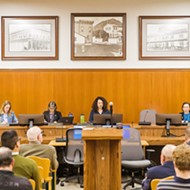
Cal Poly students demand rent control, accountability for substandard housing from SLO City Council
Jun 22, 2023

